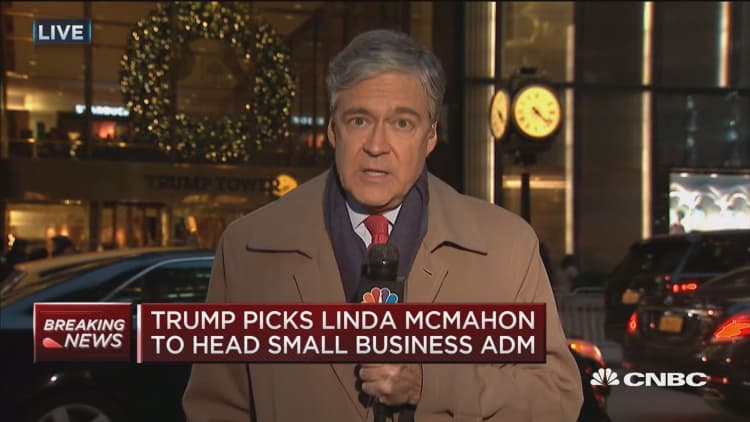When Linda McMahon was the CEO of World Wrestling Entertainment, she went to a meeting with her chief marketing officer, a man.
Meeting attendees automatically started addressing the man. He deflected the questions.
"'I could answer that but you might want to ask my boss, who is the CEO, Linda McMahon,'" McMahon recounts in an interview published on her on website.
"The assumption was that he was the CEO!" says McMahon.
McMahon and her husband Vincent bought a regional wrestling operation from Vincent's father in 1982. They started off sharing a single desk, according to the transcript of an interview with McMahon published in LEADERS Magazine. The husband and wife duo went on to expand the entertainment wrestling operation into a public company with more than 800 employees in offices around the world.
Vincent is now a billionaire and WWE has a market cap of $1.5 billion.
McMahon left the CEO role in 2009 to run unsuccessfully for U.S. Senate in 2010 and again in 2012. But soon she will be heading to Washington after all: Donald Trump has tapped her to lead the federal agency charged with representing America's small business owners.

McMahon's experiences position her to champion issues of fairness and representation. Working as the CEO of a testosterone-fueled, wrestling-focused entertainment company, McMahon became aware that men habitually looked to other men instead of considering women.
"There are too often opportunities that are not given to women but are given to men because it tends to sometimes still be the old boys' club. And I know this coming from an industry that is very male-dominated," says McMahon.
As McMahon handled hiring and promoting, she observed that women and men approached interviews differently. In general, men appeared far more comfortable with their abilities.
"Almost without fail, women wanted to know, 'Tell me exactly what is it that I really need to hone in on, and where can I sharpen my skills to do the best job for you.' A man could come in, on the other hand, and would sit down and just say, 'I've got this. I know exactly what you need. I am ready to take this on starting tomorrow,'" says McMahon.
"He may have clearly no more idea than the woman that I have just interviewed but he comes in with more confidence that he is ready to go."
In 2014, McMahon co-founded an event-based mentoring business, Women's Leadership LIVE, which aims to support and educate women entrepreneurs. She says that women tend to need a bit of coaching to be encouraged to promote their skills.
"I found when talking with many other women that they sometimes are more reluctant to toot their own horn, to talk about their success. They have to be more confident in doing that. That is not always the case, but there is that element that women don't put forth who they are," says McMahon.
The problem is pervasive, McMahon notes: Only five percent of Fortune 500 companies are led by female CEOs and only 16 percent of public company board members are women.
Those imbalances are just as stark in the start-up world. Of 700 start-up founders who responded to seed-stage venture capital firm First Round's recent survey, 83 percent are men. And 84 percent report that their company boards are either entirely or predominantly male.
And D.C., McMahon will find, is no exception: Only about one in five congressional leaders are women, according to data collected by the Rutgers Eagleton Institute of Politics.




